5 Healthiest Meats To Eat, According to Dietitians
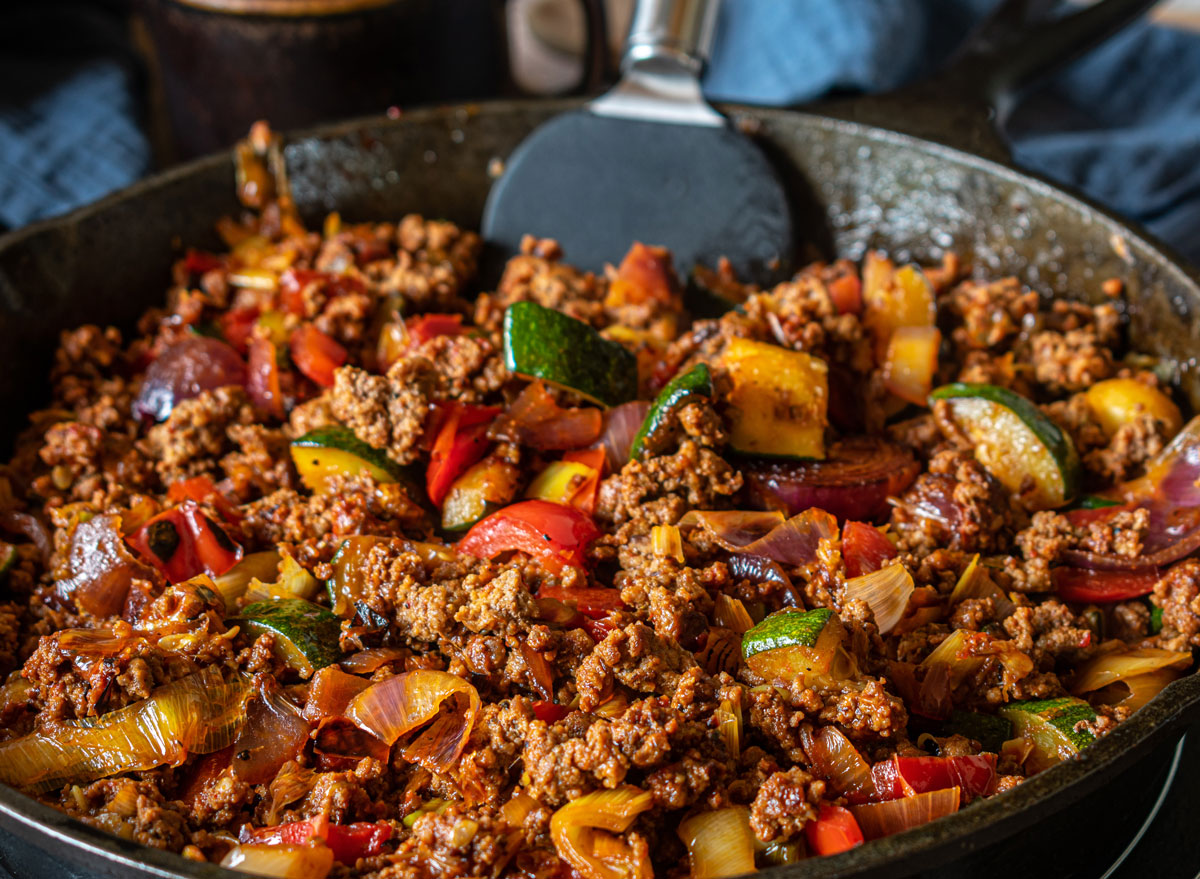
Whether you're looking to build muscle, preserve muscle while losing weight, or make filling and satisfying meals and snacks, you'll benefit from boosting your daily protein intake. While the Recommended Daily Allowance (RDA) for protein is a mere 0.8 grams per kilogram of body weight, most research and experts agree that most people, including older adults or anyone who's active or working towards weight loss, benefit from more than this amount, closer to 1.2 grams per kilogram of body weight, especially to help prevent muscle loss.
While you can easily get your protein from plant sources, animal proteins are thought to be higher quality proteins since they include all 9 essential amino acids, and they're more easily digested and absorbed than plant protein. There are two different types of animal protein: meat and non-meat. Meat can be beef, fish, pork, or poultry and non-meat is any animal by-product, such as dairy and eggs.
While some types of meat come with high amounts of saturated fat and sodium, others are incredibly healthy, offering plenty of protein and other essential nutrients like B vitamins, iron, and zinc in only a few ounces.
If you're looking to easily increase your protein, dietitians recommend adding these healthy animal proteins—both meat and other non-meat sources—to your diet. Read on, and for more, don't miss the 10 Best Protein Bars for Weight Loss.
Pork Loin
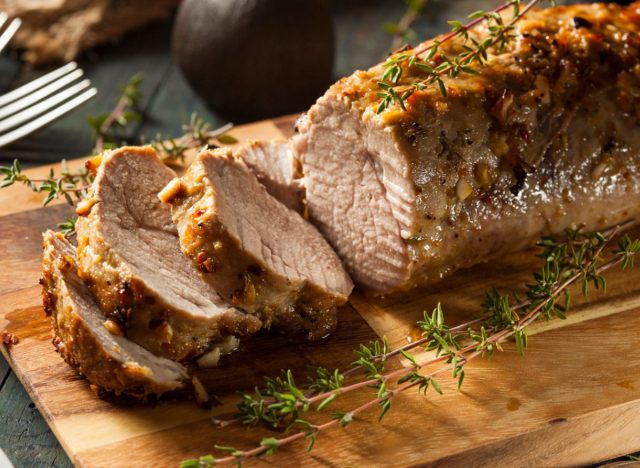
Pork loin is an excellent source of B vitamins, including thiamin, niacin, vitamin B6, and vitamin B12. B vitamins are essential for energy production and are involved in body processes from DNA synthesis to the production of neurotransmitters. Since B vitamins are water-soluble and need to be replenished daily, it's essential to include good sources in your diet on a regular basis, including pork loin, dark leafy greens, and dairy.
Just three ounces of cooked pork loin has 22 grams of protein and only 2.4 grams of saturated fat, or just 11% of the recommended daily limit.
Salmon
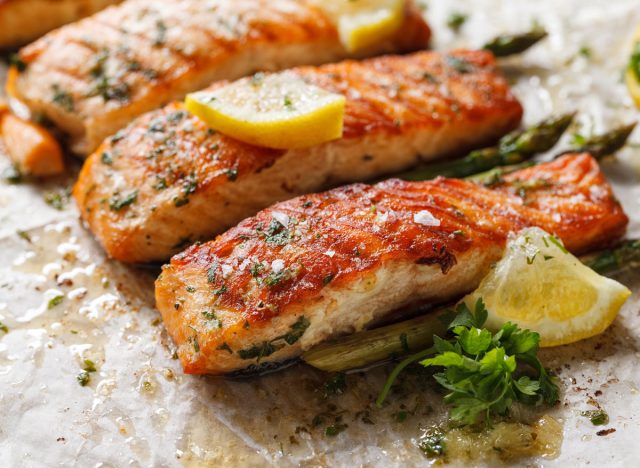
Salmon, whether canned, smoked, or baked, is a versatile and healthy animal protein. "Salmon is not just a wonderful source of protein, it's also very high in omega 3 fatty acids which are essential for heart health and even depression," says Jenna Volpe, RD functional registered dietitian of Whole-Istic Living.
One 3-ounce serving of Wild Atlantic Salmon has 7 grams of fat, most of which come from heart-healthy omega-3 fatty acids, which research has found to be anti-inflammatory and beneficial for skin and joints, explains Volpe.
Extra Lean Ground Beef
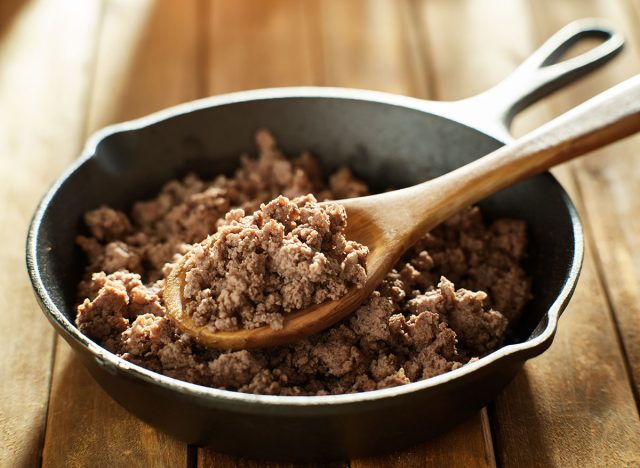
While red meat can have an unhealthy amount of saturated fat, extra lean ground beef has the protein, vitamins, and minerals that beef offers with a low amount of fat. It's also an accessible and budget-friendly option that can be used in everything from stews to tacos and burgers. Extra lean ground beef is at least 90% lean with 10% or less fat.
"Beef contains some key nutrients for various bodily functions, immune support, and energy metabolism such as iron, zinc, B-vitamins like B12 and niacin, and selenium," says Amber Trejo Ms, RDN, CDN, CPT, founder of Naked wellness coaching. Just one 3-ounce serving of ground beef has 22 grams of protein, 12% DV of iron, and 50% DV of zinc.
Sardines
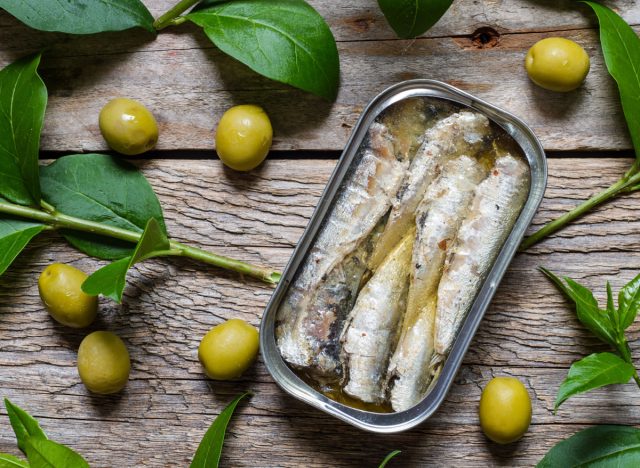
Tinned fish is having a moment, and the only surprise is how long it's taken for this budget-friendly and convenient protein source to gain mainstream popularity. "Sardines are high in essential nutrients such as protein, vitamin B12, vitamin D, calcium, and minerals," says Wan Na Chun, MPH, RD, CPT of One Pot Wellness.
Just one 3.75-ounce can has 22.6 grams of quality protein as well as 27% of the DV for calcium. These nutrients are essential for strong bones and healthy skin, and they're also rich in omega-3 fatty acids, which can help reduce the risk of heart disease and improve blood vessel function, Chun adds.
Cod
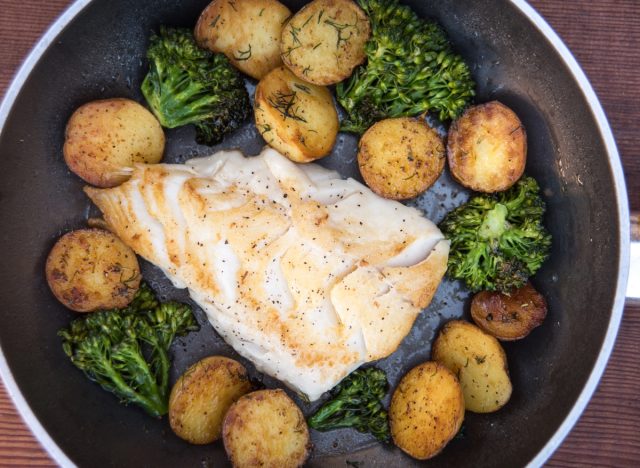
"The USDA suggests consuming a minimum of two portions of seafood per week, with each portion approximately equal to 3-4 oz. of fish or shellfish, but a substantial portion of the American population, potentially up to 90%, fails to consistently meet this recommendation," says Caroline Thomason, RD, CDCES, who is a dietitian in Washington, D.C., and nutrition partner to Alaskan Seafood.
If you don't love the fishy taste of salmon or sardines, cod is an excellent high-protein seafood choice that's mild in flavor and incredibly easy to use. With less than 1 gram of fat, only 90 calories, and 19 grams of protein per 3-ounce serving, it's a healthy and protein-rich choice for dinner.
Plus: 2 Meat-free animal proteins
Greek Yogurt
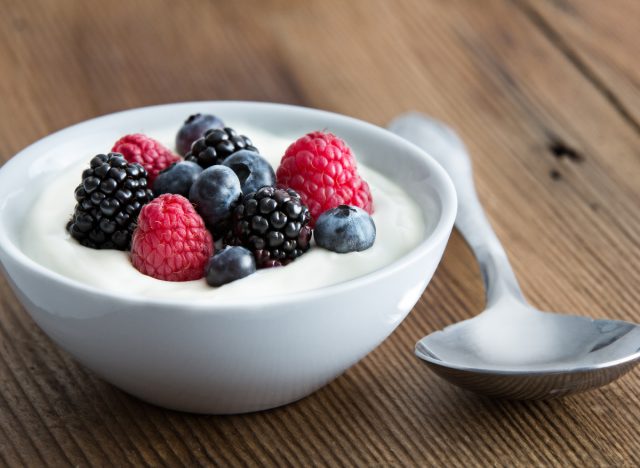
For an animal protein that's meat-free, but still high in protein and full of essential nutrients, try Greek yogurt. "Not only is Greek yogurt full of probiotics and essential nutrients like calcium and vitamin D, but it's also high in protein," says Caroline L. Young, MS, RD, LD, RYT of Whole Self Nutrition. While you could choose non-fat Greek yogurt to reduce saturated fat and calories, Young recommends full-fat versions for higher satisfaction and better taste.
Eggs
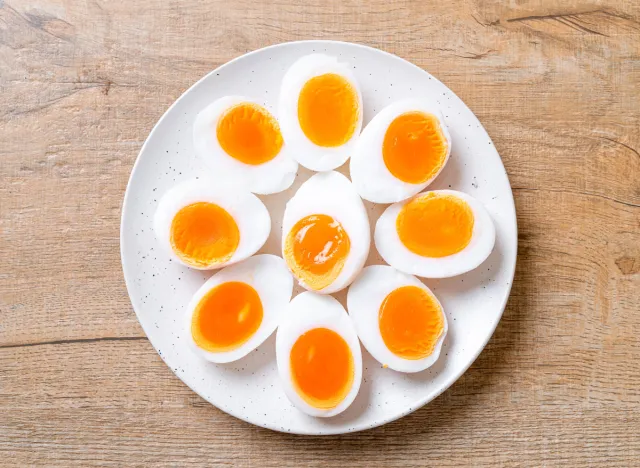
Eggs are a nutritious and budget-friendly protein source that can be eaten hard-boiled, scrambled, sunny side up, added to baked goods, and in a number of other ways in the kitchen. Just one egg has 6 grams of protein and is a good source of several B vitamins and selenium. One egg also provides 31% of the DV for choline, a mineral essential to lipid metabolism, brain health, and fetal brain development.
- Source: https://www.ncbi.nlm.nih.gov/pmc/articles/PMC5872778/
- Source: https://www.ncbi.nlm.nih.gov/pmc/articles/PMC7926405/
- Source: https://fdc.nal.usda.gov/fdc-app.html#/food-details/167842/nutrients
- Source: https://www.ncbi.nlm.nih.gov/pmc/articles/PMC9662251/
- Source: https://fdc.nal.usda.gov/fdc-app.html#/food-details/171998/nutrients
- Source: https://www.ncbi.nlm.nih.gov/pmc/articles/PMC4030645/
- Source: https://fdc.nal.usda.gov/fdc-app.html#/food-details/174031/nutrients
- Source: https://fdc.nal.usda.gov/fdc-app.html#/food-details/175139/nutrients
- Source: https://www.ncbi.nlm.nih.gov/pmc/articles/PMC10153001/
- Source: https://fdc.nal.usda.gov/fdc-app.html#/food-details/171956/nutrients
- Source: https://fdc.nal.usda.gov/fdc-app.html#/food-details/2340803/nutrients
- Source: https://fdc.nal.usda.gov/fdc-app.html#/food-details/748967/nutrients
- Source: https://ods.od.nih.gov/factsheets/Choline-HealthProfessional/









